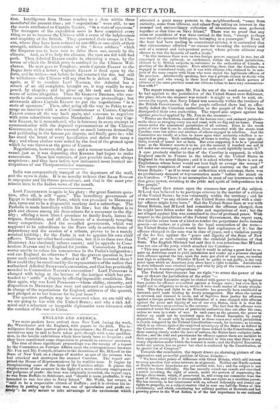Lord PALMERSTON is again in his glory : the great
Eastern ques- tion, after all, is still "open." The hereditary government of Egypt in feudality to the Porte, which was promised to MEHEMET Au, turns out to be a disgraceful mockery and a subterfuge. The Pashalic is made hereditary within his line ; but the Sultan is to pick and choose among his descendants for a successor to the dig- nity; offering a most liberal premium to family feuds, harem in- trigues, fratricides, and all the horrors of a monopoly tempting many competitors. And the so-called government, which was supposed to be subordinate to the Porte only in certain forms of dependency and the cession of a tribute, proves to be a merely nominal lordship ; for the Pasha is not to appoint his own chief officers. There are other hard conditions, but it is to these two that MEHEMET ALL absolutely refuses assent ; and he appeals to Com- modore NAPIER and to England for justice. Commodore NAPIER seem,s unable to refuse his concurrence in the Pasha's indignation ; and can England do otherwise ? But the gravest question is, how came such conditions to be offered at all ? Who invented them ? How could they be sanctioned by the representative of the nation that authorized Admiral STOPFORD'S convention, and that has practically acceded to Commodore NAPIER'S convention ? Lord PONSONBT is charged with being at the bottom of the intrigue which has pre- tended to " settle " a dispute by offering impossible conditions. But then again, why was Lord POI% SONBY—whose ability, sincerity, and disposition to MEHEMET Au were not untested or unknown—left in charge of the negotiations for England, arbitress of the quarrel, and pledged as to her honour for its just issue ?
The question perhaps may be answered when we are told why we are going to war with the United States ; and why a sick Ad- miral and a reluctant or incapable diplomatist were intrusted with the conduct of the war in China.


























 Previous page
Previous page